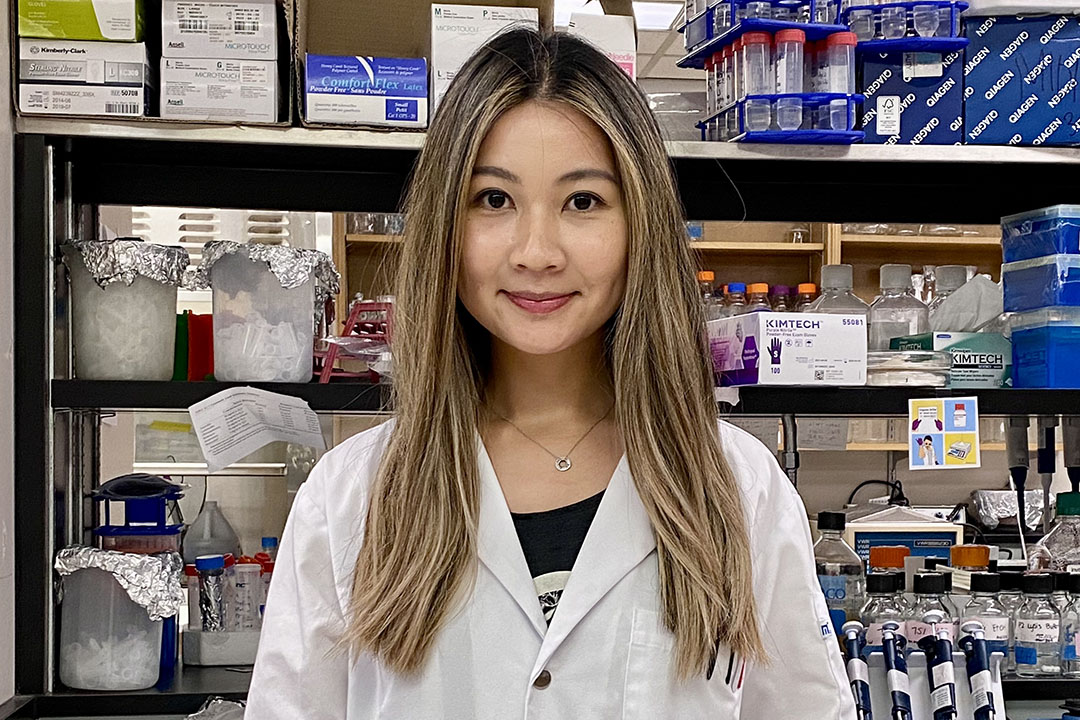
USask research investigates what can happen when immune system proteins go rogue
A specific family of DNA-modifying proteins normally function as part of the human immune system to combat viral infections. But what happens when these proteins begin to modify DNA – and go rogue?
By BROOKE KLEIBOERScientifically known as apolipoprotein B mRNA editing enzyme catalytic polypeptides (APOBECs), and with actions detected in many types of cancers, including breast, lung, and ovarian, medical researchers such as University of Saskatchewan (USask) PhD candidate Lai Wong are on a mission to understand the role of APOBEC proteins in DNA mutations.
“I’ve always been interested in cancer research because it’s fascinating to me how our cells run like little, well-oiled machines, but only a couple mutations can cause everything to malfunction,” said Wong. “If our cells acquire too many mutations, it can lead to the development of cancer as well as help the cancer evolve and grow.
“We currently don’t know if APOBEC-induced mutations can initiate cancer or drive cancer evolution. The goal of our research is to understand how these proteins gain access to our DNA and what downstream effects they have on our cells.”
Wong said that APOBEC proteins cannot be judged for their cancer risk using the same biological markers as other proteins, making APOBECs an interesting subject for researchers.
Uniquely, APOBECs can only act during the stage of DNA replication when the double-stranded structure is split. These single strands of DNA only exist for a short period of time in the DNA replication process before they are copied and combined with another strand. APOBECs must perform their duties during this time span only, making it difficult for researchers to visualize these proteins in action to better understand their role.
Supervised by College of Medicine professor Dr. Linda Chelico (PhD), Wong’s work involves developing and optimizing experiments that can be used to study the effects of APOBECs on cancer caused by mutations.
Results thus far have determined that APOBEC proteins all have unique biochemical characteristics that dictate how well they can access DNA strands. A factor such as how fast the APOBEC protein can ‘climb’ on and off the DNA strand can help researchers to predict how likely APOBECs can modify DNA and potentially induce mutations.
“If we can determine what effects APOBECs have on cancer initiation and progression, we may be able to use these proteins to find a drug to block cancer initiation or to suppress cancer evolution during therapy,” said Wong.
Wong hopes to continue to play a role in the work even after her PhD project is complete.
“I am interested in pursuing a career in clinical research because I’d like to be involved in testing the efficacy and safety of treatments in clinical trials,” said Wong. “I have succeeded in my graduate studies because of the calibre of ongoing research (at USask) led by experts in the field.”
The research is supported by the Natural Sciences and Engineering Research Council of Canada, and the Canadian Institutes of Health Research.
This article first ran as part of the 2022 Young Innovators series, an initiative of the USask Research Profile and Impact office in partnership with the Saskatoon StarPhoenix.

